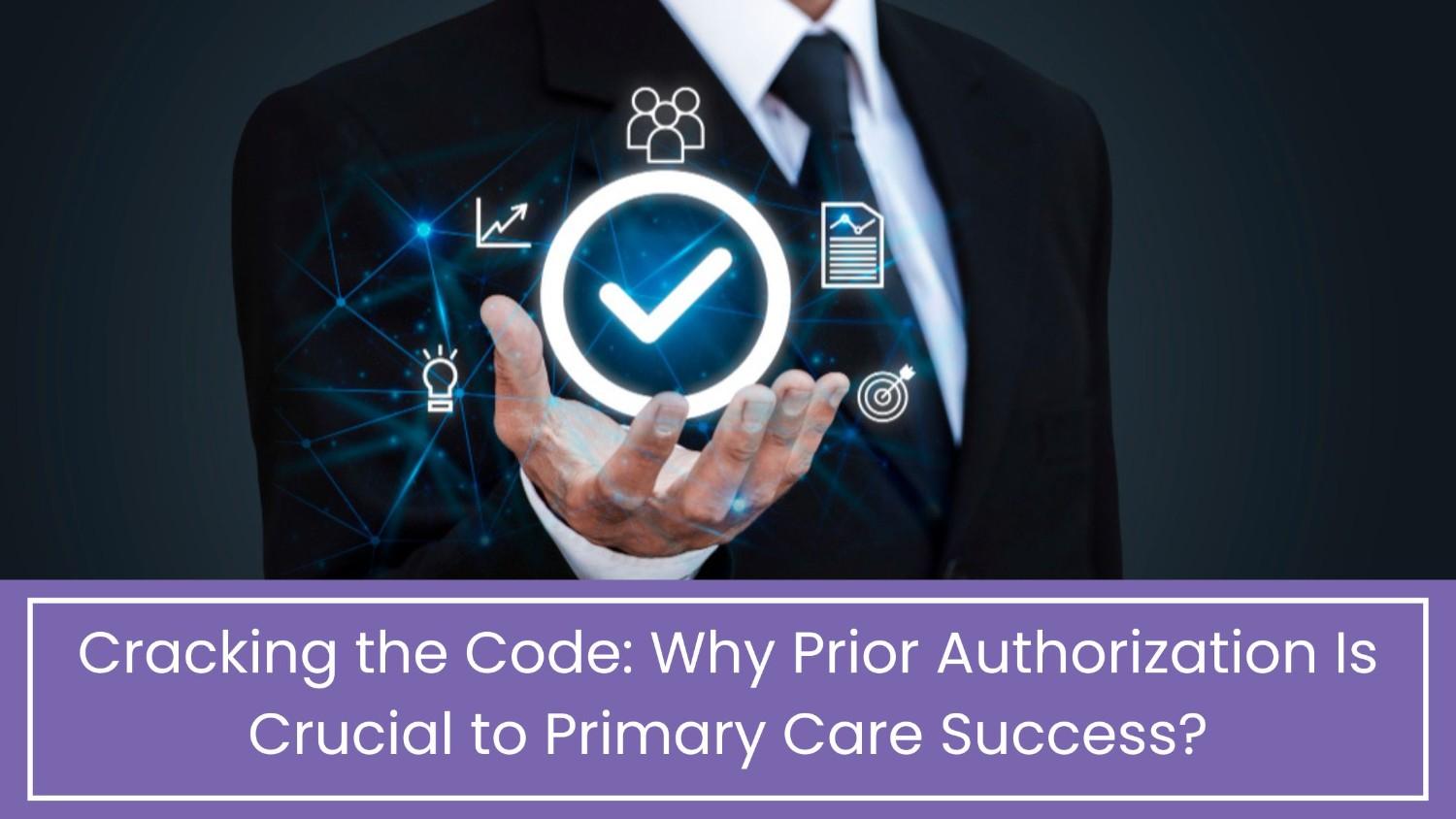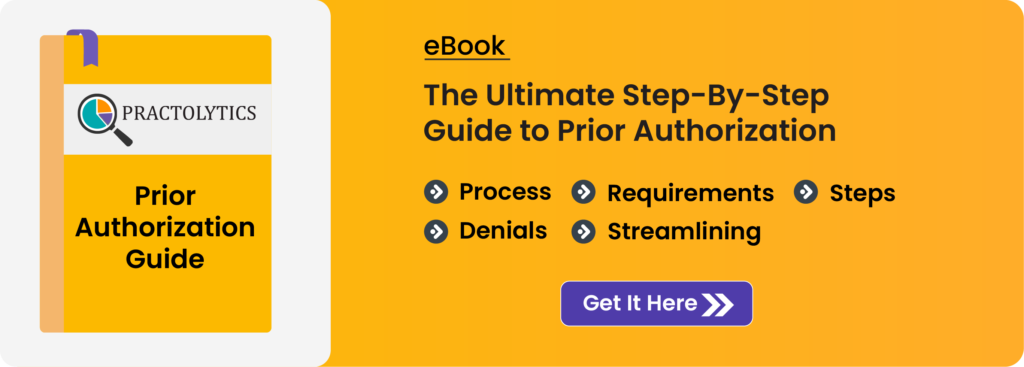Importance of Prior Authorization in Primary Care
The Importance of Prior Authorization in Primary Care goes beyond paperwork—it directly impacts patient care and your practice’s revenue. If your team spends hours chasing approvals, it’s time to rethink the process. When handled strategically, prior authorization can reduce denials, improve patient flow, and enhance overall practice efficiency. In this blog, we explore how to make PA work for your practice, not against it. Plus, discover how Practolytics supports providers with seamless prior authorization solutions, allowing your staff to focus more on patient care and less on administrative burdens.
Table of Contents
Cracking the Code: Why Prior Authorization Is Crucial to Primary Care Success?
In today’s primary care environment, delivering quality patient care is only half the battle. Behind the scenes, providers are navigating a maze of administrative demands—and chief among them is prior authorization (PA). It’s one of the most frustrating parts of practice management, yet it plays a decisive role in determining how smoothly care is delivered, how quickly patients are treated, and how consistently revenue flows into the practice.
At Practolytics, we work with over 1,400 providers across 31 states, processing more than 5 million claims each year. What we’ve learned is simple: when primary care practices take prior authorization seriously, the payoff is huge. But when it’s mismanaged, it can become a bottleneck that slows everything down, from treatment plans to cash flow.
In this blog, we’re diving deep into the why behind prior authorization. Not just the red tape, but the strategic opportunities it unlocks when handled correctly. This isn’t about the basics. It’s about transforming your PA process into a performance engine for your practice.
Why Prior Authorization Deserves a Front-Seat in Primary Care?
Primary care providers are often the first point of contact in the healthcare journey. That means you’re fielding everything from routine check-ups to chronic disease management, behavioral health billing, lab tests, imaging, and specialty referrals. And each of those services could be subject to PA requirements that differ from payer to payer.
According to the AMA, 94% of physicians report care delays due to prior authorizations, and over 30% say these delays have led to serious patient harm. Yet, the demand for prior authorization keeps growing, especially for advanced imaging, medications, and durable medical equipment.
Why the rise? Payers see PA as a cost containment strategy. But for providers, it often means slowed workflows, strained staff, and unhappy patients. Unless you build a system to manage it strategically.
Beyond Approvals: Prior Authorization as a Strategic Asset!
Too many practices treat PA as a task to be checked off, not a process to be optimized. At Practolytics, we help our partners reframe PA as an essential step in their patient care and revenue cycle strategies.
When done well, PA can:
- Ensure faster, uninterrupted care
- Reduce claim denials downstream
- Clarify coverage and reduce billing surprises
- Strengthen relationships with payers through compliance
Here’s how PA fits into a modern, high-performing workflow:
Strategic Impact of Prior Authorization Across the Practice
|
Stage of Practice Workflow |
Strategic Role of Prior Authorization |
Benefits When Optimized |
|
Patient Intake |
Identify covered services, flag PA needs early |
Reduces delays and surprises later |
|
Clinical Decision-Making |
Align treatment plans with covered options |
Improves approval rates, patient trust |
|
Referral Management |
Verify medical necessity and streamline documents |
Lowers risk of referral denials |
|
Claim Submission |
Ensure PA documentation is attached |
Reduces rejections and resubmission workload |
|
Revenue Collection |
Avoid unexpected denials |
Improves cash flow and patient satisfaction |
When you start integrating PA strategically into every phase of care, you’re not just reducing headaches—you’re protecting revenue.
What Happens When PA Goes Wrong?
The numbers are sobering. According to the Medical Group Management Association (MGMA), practices spend over 14 hours per physician per week just on prior authorization. And every hour lost to PA inefficiencies is one less hour your team could spend on patient engagement or follow-up care.
The ripple effects are real:
- Increased staffing costs
- Slower patient throughput
- Delays in chronic condition management
- Patient dissatisfaction and leakage
- Burnout among front-office and billing staff
For many practices, these aren’t occasional hiccups—they’re daily roadblocks.
It’s Not Just a Clinical Issue. It’s a Financial One.
One of the biggest misconceptions about prior authorization is that it’s purely clinical. It’s not. It’s a crucial financial gatekeeper. Every missed PA can translate directly into denied claims, lost revenue, and wasted hours.
In fact, PA-related denials are one of the top five reasons for claim denials in primary care. And because many of these services are high-value, the cost per denied authorization is steep.
Common Services in Primary Care That Usually Need Prior Authorization
|
Service Type |
Examples |
Why It Matters Financially |
|
Diagnostic Imaging |
MRIs, CT scans, echocardiograms |
These aren’t cheap—costs often run $400 to $2,000 or more. If the prior authorization isn’t done right, the claim may be denied, leaving your practice and the patient to deal with the bill. |
|
Prescription Medications |
Biologics, specialty drugs, long-term prescriptions |
Some of these medications can cost thousands. If PA is missing, patients might be left waiting—or worse, going without a crucial medication. |
|
Specialist Referrals |
Cardiology, orthopedics, gastroenterology |
These typically cost between $150 and $600. A missed PA can delay care, frustrate patients, and affect continuity of treatment. |
|
Durable Medical Equipment |
CPAP machines, glucose monitors, mobility aids |
When a patient needs equipment, delays due to PA issues can be discouraging. And costs can climb up to $3,000. |
|
Mental Health Services |
Therapy sessions, psychiatric visits |
Even though each session may be $100–$250, missing authorizations can disrupt care plans and lead to denied claims. |
Multiply that by the number of patients you see weekly, and it becomes clear: getting PA right isn’t optional. It’s essential to keeping your practice financially healthy.
What Technology Can (and Can’t) Do for You?
There’s no shortage of tools on the market promising to automate PA workflows. And to be fair, many EHRs and clearinghouses now offer embedded PA modules. But the real-world truth? These tools often require human oversight, payer-specific configuration, and constant updates to stay compliant.
You still need a dedicated team that knows how to:
- Interpret clinical documentation
- Understand and track changing payer rules
- Navigate various submission platforms
- Handle appeals and re-authorization
Software supports the process, but it doesn’t run itself. Most practices don’t have the bandwidth to manage this internally—especially with ongoing staffing shortages.
Hidden Link Between PA and Value-Based Care!
As more primary care practices shift toward value-based models, timely and accurate prior authorization becomes even more important. Why? Because value-based care depends on outcomes, and outcomes depend on access.
Delayed imaging, postponed prescriptions, or interrupted specialist care can lead to:
- Worsening patient conditions
- Avoidable ER visits
- Increased hospitalizations
All of which negatively impact your quality metrics and shared savings. On the flip side, a streamlined PA process helps ensure care is delivered efficiently and on time—boosting both outcomes and revenue potential.
Staffing Burnout: The PA Problem No One Talks About!
Ask your front-office staff what they dread most, and “prior authorizations services” will be near the top of the list. The constant back-and-forth with payers, the unclear requirements, and the hours spent on follow-up calls—it’s exhausting.
Turnover in billing and front-desk roles is often tied to these frustrations. And every time you lose a trained staff member, the cost of retraining and the risk of errors increases.
Which brings us to the most important part of this blog.
Why Outsourcing Prior Authorization Is a Strategic Move?
Let’s be clear: outsourcing isn’t about giving up control. It’s about choosing efficiency. At Practolytics, we offer a specialized PA support model designed specifically for primary care practices. We bring:
- 20+ years of RCM experience
- Knowledge of 28+ medical specialties
- 100% HIPAA-compliant processes
- Real-time tracking and reporting
- Seamless integration with EHR and medical billing platforms
When you outsource your PA workflow to Practolytics, you gain a team of trained professionals who:
- Handle all documentation and submission tasks
- Monitor payer portals and follow up proactively
- Reduce your turnaround time
- Catch and correct errors before they become denials
Our clients have seen up to a 45% improvement in approval times and a 37% reduction in denied claims within the first 90 days.
You don’t have to manage this alone. With Practolytics, prior authorization becomes a seamless, behind-the-scenes process that supports your practice instead of draining it.
Final Thoughts: Time Is Tight—Let’s Help You Get It Back!!!
If you’ve ever found yourself staying late at the office, just to follow up on pending authorizations or sort through confusing payer rules, you’re not alone. Most primary care teams didn’t sign up to chase approvals—but in today’s healthcare world, prior authorizations have become part of the daily routine.
The problem is, they take too much time. They slow down care. They frustrate patients. And if something gets missed? It can hit your bottom line hard.
It doesn’t have to be this way.
Prior authorization, when handled properly, can support better care coordination, protect your revenue, and ease a lot of the pressure on your staff. But expecting your already busy team to do all of that perfectly—on top of everything else—isn’t sustainable.
That’s why so many practices trust Practolytics. For more than 20 years, we’ve supported providers across 31 states, helping them take control of their operations without burning out their staff. We process over 5 million claims each year, and we know the ins and outs of payer workflows, timelines, and documentation—so you don’t have to.
We don’t just “handle” prior authorizations. We simplify them, track them, follow up on them, and make sure they don’t fall through the cracks. That means fewer delays, fewer denials, and less stress for everyone.
If prior auth has become a pain point in your practice, we’re here to help you fix it—quietly, reliably, and without adding more to your plate.
Read More – Prior Authorization Services for Podiatry : improving Patient Access and Care
Talk to Medical Billing Expert Today — Get a Free Demo Now!





